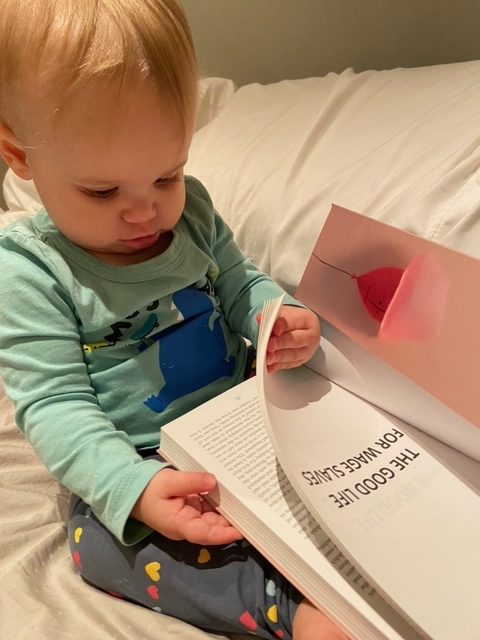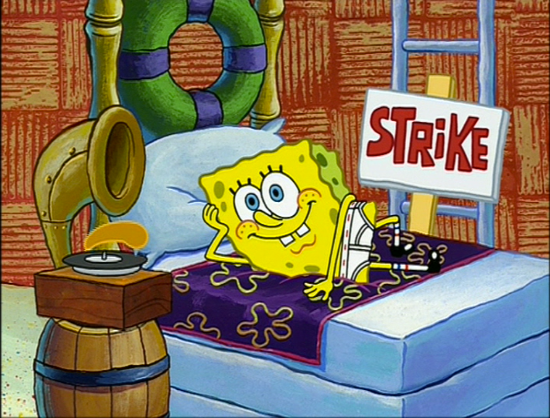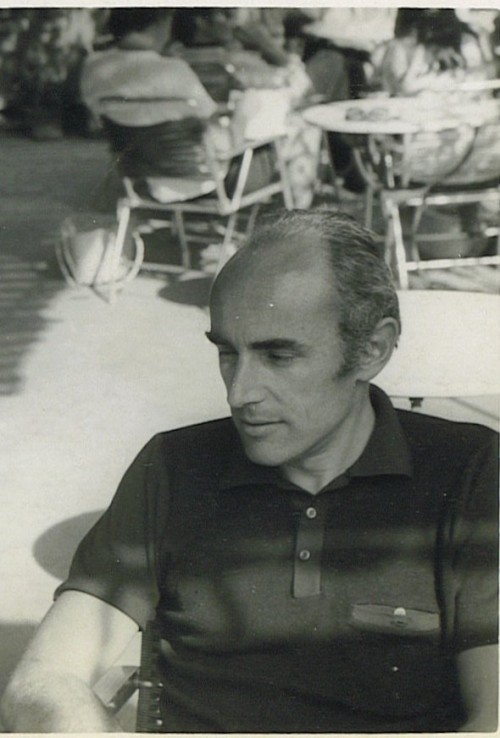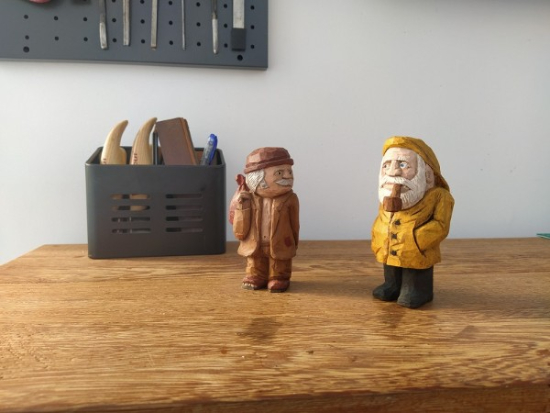Bang Head Here
Reader Graeme writes by email:
I recently moved into a new office. It is the first time I’ve had the pleasure of having an office all to myself – thanks to Covid. The space was previously occupied by a revolving door of procurement and administrative staff. Many of their personal effects remain. The hard hat of a man fired three years ago still hangs on the wall. As I was staring off into space this morning at my desk I noted a faint message on the poorly maintained whiteboard. It read: “Bang Head Here.”
“Bang Head Here” is a classic of “defeated office worker” humour, isn’t it? It tells the story of executive know-nothings being impossible to satisfy and ever-expandable, constantly changing project briefs. Fuck it!
The specifics of the white board message aside, I love this sort of thing. “Left-behinds,” I call them, and there’s a sort of forlorn magic to them. I ache slightly when I see things like the sacked man’s hard hat: it’s a minor version of the eerie feeling one gets when looking at pictures of abandoned places. I can only imagine the magic of such items has intensified during the pandemic for people like Graeme who are currently working in deserted offices.
In every office I ever worked in, I became slightly preoccupied with staring at the tiny pieces of Christmas tinsel (or just blu-tack or push pins) in some corners of the ceiling. My name for this sub-genre of left-behind is “Ghosts of Christmas Past.” The story they tell is of the decorations being put up as a time-wasting exercise while the end-of-term spirit prevails and then being torn down quickly and unceremoniously upon the staff’s return to work.
Graeme’s message reminds me that white boards are actually a very good place to find left-behinds: the impressions of meetings of yesteryear. Meeting room white boards, in my experience, aren’t used very often so when the someone in a technical team draws a diagram of how a website or an arrangement of computer servers will work in theory, it’ll be there for us non-techies to wonder about for months while we try to survive our weekly team meetings or annual appraisals.
There were also the bits and pieces I wrote about in The Good Life for Wage Slaves (in a slice of memoir called “put the office in the bin” about a wonderful throwing-out session when we were forced to downsize our department). We found the left-behinds of a long-ago-retired colleague in the bottom drawer of a file cabinet. It was quite the archaeological adventure and it brought to mind the image of her fleeing on her last day. “Leave them, just go, go, go!” Here’s where to buy the book if the story appeals to you.
Back to Normal, Anyone?
When headlines began to declare last week that a vaccine was good to go and that the most vulnerable could start receiving it as early as the first week of December, my soul did a funny thing. It leapt. It did a little air punch and went “yeah!” but this celebratory motion of the spirit was quickly followed by a sense of, “oh.”
Maybe you experienced it yourself. It was like sensing that a long illness is over (“yeah!”) and that you can finally get out of bed and go back to work (“oh.”)
I know I won’t be the only one who experienced this. Ever since the pandemic began there have been environmentalists and anti-capitalists for example who, while lamenting the crisis, were able to see from their vantage points that “normal” had always been part of the problem. We should use the time afforded by the pandemic, they said, to regroup and come up with a better model for life.
Chief among our concerns about so-called normality are unnecessary commuting to work in cars and ram-packed trains, unnecessary economic activity full stop, and flying around in planes for frequent holidays and meetings. I often think of Mark Boyle who, in his book, goes back to the land and sees a plane overhead from his tiny Irish smallholding. He reflects on how alien it would be to him now to fly for an overseas holiday and he says something shruggish (I can’t find the exact quote) along the lines of “I guess that’s just what people do now.” It’s the implication that we’ve all just sleepwalked into what is actually a fairly remarkable and unsustainable “normal” of technologically miraculous but ecologically and socially irresponsible pursuits.
It’s wonderful that we can just take off and go to another country at the drop of a hat. Wonderful! But, historically (by which I mean by comparison to the past and the future) a bit odd. News that 1% of people are responsible for half of all flight emissions has made me feel less guilty about my love of mobility but I’d still like to fly less and for other people to fly less too.
The biggest event I had to cancel in March 2020 was a trip to Portugal. I was already jonesing for travel at that point, having not been anywhere for about a year. I haven’t been grounded for so long since that football went through the neighbour’s window in 1989. In practice, it hasn’t been so bad to go deep instead of wide but I’d still love to have width as an option again, which is probably how a lot of people feel about the return to work.
Still, going deep instead of wide has paid dividends for those willing and able to embrace it, and it would be a shame to completely give it all up.
A return to the old pace of life is being cautioned against, not just by passionate activists but by easygoing newspaper columnists. Here’s Nesrine Malik this morning on how the activities with which she has filled her pandemic time are threatened by the return to normality:
With the suspension of the mindless daily activity of normal life, an entire hinterland of dormant relationships emerged. But even as I tried to pick up these pieces my brain kept skipping forward. I found myself dreaming of the time when the everyday could restart again – even though, in all likelihood, that would mean these threads being buried once more.
In no longer having to travel for work, she says, she’s been able to put time into important correspondence, feeling out and maintaining important human connections. Should we really sacrifice this, along with everything else, for the return to normality?
That we have a vaccine and the end of the pandemic is in sight is undoubtedly a good thing. I just wish there had been more of an appetite for regrouping and questioning the nature of our return to normality. There has been a certain line of questioning, but I suspect that most people are going stir-crazy at home and just want to get back to flying around and driving and shopping and going to work like they used to.
I also suspect we will see busybodies of various official stripes, out in force, saying “back to work, you,” “back to work, you.” I predict a moralistic pressure that we all “do our bit” to get the floundering economy back on its feet despite the fact that working from home instead of the office has born no significant reduction in productivity.
Will we return to a “normal” rejigged to be less competitive, more sustainable, more spiritually-rewarding? Or will the extrovert ideal once again prevail though, by its nature, shouting the loudest? We shall see.
Be A Winner Like This Baby
Hey, look! Everyone’s reading The Good Life for Wage Slaves, even adorable babies.

You Got Me Livin’ Like a Slob

This is hilarious. Spongebob Squarepants once featured a short bluegrass song called “Hey, Mean Mr. Bossman.”
It’s a parody of Take this Job and Shove It, but more generally a piss-take of the sort of attitude we display here at New Escapologist. It’s great. It goes:
Hey, mean Mr. Bossman,
I’m a-quittin’ this here job.
You’ve been outside gettin’ tan
An’ I’ve been gettin’ robbed.
My life is worth so much more
Than a dollar an’ ten an hour,
Wakin’ up ’bout a quarter to four
An’ I’m startin’ to turn sour.
So, hey, mean Mr. Bossman,
I’m a-quittin’ this here job.
I’m sick of eatin’ oat bran
An’ livin’ like a slob.
You got me livin’ like a slob.
Mr Job
I stumbled today upon a seemingly rare bit of idealist anti-work music. It’s “Mr. Job” by The Alan Bown Set.
Just as cheerfully anti-work is The Good Life for Wage Slaves, still available here.
Luke Rhinehart (1932-2020)
“You lead a dull life, a life of slavery, a life that doesn’t satisfy you, but there’s a way to get out of it. This way is the dice. Let yourself go, submit yourself to it, and you’ll see, your life will change, you’ll become someone you can’t even imagine.”
So said Luke Rhinehart, the legendary Dice Man, who we lost on November 6th.
Luke (real name George) was a good friend to the magazine and a surprise character in my life. I’m grateful to him and I already miss him.
Rest in Chance, George.

Godspeed, Box!
We take advice from many literary sources here at New Escapologist. From children’s fantasy to DH Lawrence.
The words “barrel” and “scraping” might come to mind when I tell you this, but the lid of this knackered old shoebox has some good advice for life too.
I’m sure it’s only there as a point of corporate greenwashing, but you can’t knock the words when you take them at face value.

I decided to follow the “reuse” advice and use the shoebox to ship a stereo speaker I’d sold on eBay.
Something went wrong though and the customer returned it, so the box did double-duty by coming all the way back to me.
Even after all this, the box was not yet ready to disintegrate. So I used it to send five copies of my book to the legal deposit agency.
Here’s hoping they make it. Gulp. Godspeed, box!
Letter to the Editor: I Always Suspected This May Not Be a Good Way to Live

Hi Robert,
I’m a long-time fan of your blog. Your content is a breath of fresh air on an Internet plagued with work worship, life coaches, productivity tips and the “power lunch” mentality. I started reading your book yesterday and it’s difficult to stop. Your writing style is a brain massage.
Let me tell you a little about myself: I’m Brazilian, male, 33 years old, and have what every parent here raises a child to get: a public-sector job. The admission exam for this type of job is very, very hard, demanding years of single-minded preparation. Once you pass it, your job entails massive boredom, senseless tasks and good pay, normally for life.
I always suspected this may not be a good way to live, even before setting foot in an office. After twelve years of living this life my soul was in an advanced state of corrosion. The paycheck never brought the lasting happiness that everybody said it would. The material goods it made possible did not motivate me any longer.
The turning point was when I needed a haircut one day. To get a haircut I needed to program my schedule one week in advance to carve out twenty minutes for it. Enough! I was a slave on gold chains. This must not go on.
On this journey through open plan offices and noisy coffee machines, I always made sure to save my money, knowing full well that I would not be able to bear the 37 years of mandatory work for retirement. Last November I made a deal with management to take one day off per week (Wednesday) with the matching 20% reduction in pay. I had made very few decisions in my life as intelligent as this one.
With this improvement in my life came a change in perception about the value of work. I started living in a more leisurely way. I barely noticed the 20% pay cut but it was difficult not to notice a holiday every week.
A year later here I am: new hobbies, new interests, and far more content than ever before. Hell! I’m making wood sculptures when twelve months ago I didn’t even know how to draw! In the workplace I’m a tech guy (the one with a spreadsheet for everything) and art apparently shouldn’t be attempted by people like me! Yet here I am, having a blast at cutting wood, not typing numbers on a computer. Imagine how many people have too hidden talents that will never see daylight because a job sucks away all the energy.
In the centuries to come we’re going to look to today’s offices and feel the same as when we look for Industrial Revolution factories. How could we do that to people?
I’m grateful for you being a voice against the madness of work and so-called productivity. I realized I’m not alone and very happy to realize this relatively early on life.
I attached some images of the sculptures. It takes hours and hours to make one, but who’s counting?
Best regards,
F
No, No, and No Again
My friend Tim likes to read books about Economics. In one of them, he found this and sent it on to me:

“It sounds like something from Escape Everything!” he says. He’s right too.
I Googled this enlightening passage and it seems to come from William Bernstein‘s forward of Johnathan Clements‘ book, How To Think About Money. I don’t quite know who either of those people are (though some of the FIRE fighters among you surely will) but it’s nice to have one’s dreamily-arrived-at sentiments echoed by some deep-browed types.
Are You Glued to the News?
Oliver Burkeman’s amusing (but ultimately useful) Guardian column about self-help was always a good thing. He recently stopped doing it but, almost in its place, rises a newsletter called The Imperfectionist, which is (so far) even better than the column.
On November 3rd, the day America went to the polls, he observes that people have, in recent years, developed a tendency to “live inside the news”:
[Since 2016 it] was as if more and more people were shifting their psychological centre of gravity, so the news was somehow realer to them than the concrete world of their work, family and friends. I don’t just mean that they were “spending too much time online” or “addicted to social media” (although they were, and we are). I mean that the realm of presidencies, referendums and humanitarian crises had become the main drama of their daily lives, with their actual daily lives relegated to the status of a sideshow.
He’s right. I noticed that too. When I first worked in an office in 2006, it was against the rules to read the news during work time and most of the major news sites were blocked. When I made a brief return to that world over a decade later, it was generally considered inhumane to disallow access to the news. It had become common to practice to keep a rolling news app in the corner of the screen and we’d all openly talk about news events as they unfolded.
In the “how then shall we live?” corners of the Internet, a lot of us used to suggest turning a blind eye to the news in the interests of mental good health and focusing instead on more important or fulfilling things like idling or the development of escape plans. The really important information would reach you eventually, was the general idea, and the rest of the news was beyond your control and tantamount to gossip. Better to ignore it, we said. But since 2016 (and especially now in 2020) the ostrich strategy hasn’t really been possible. We need to know where it’s safe to go and what we’re allowed to do. For better or worse, that’s important information and we can’t just look away.
There is, however, a line between staying usefully informed and being swept away by the sort of nervous, unproductive horizon-scanning that emerges from general anxiety. There’s also a difference between being open to useful guidance from political or cultural leaders and hoping so fervently for certain outcomes that one feels like one can’t ever look away. Staying glued to the news at the cost of, say, reading a novel or going for a walk or being consciously present with loved ones, doesn’t help your hoped-for outcome to happen.
Anyway, Burkeman says it all rather well and he urges the reader to find ways to focus on friends and family and generally more local pursuits instead of, this “living inside the news,” so I urge you to check it out.
You hear it said that it’s a marker of privilege to be able to back off from the news – to spend a pandemic planting bulbs in your backyard, or get absorbed in your creative work while democracy declines. But if it really has become a privilege to retain one’s sanity, I think it’s one the privileged need to exercise, not disavow. In an era when the news leaves half your friends paralysed by misery, it’s no indulgence to make time for whatever’s pleasurable or engrossing in your life. On the contrary, the world needs sane people more than ever.



